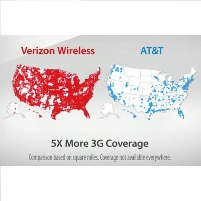Since Government is Lax at Regulating Misleading Ads, Companies Turn to Lawsuits
Monday, November 23, 2009

White space. That’s why AT&T recently sued Verizon in civil court…because a Verizon advertisement showed a U.S. map of its competitor’s wireless coverage areas. The abundance of white space on the map implied that AT&T’s cell phone program failed to cover large parts of the country, and that was grounds enough for the telecommunications company to go after its rival in court. AT&T claims that the map implies that they have no coverage in the white areas, when the map actually only represents AT&T’s 3G coverage…a fact that is clearly stated in the map text.
The AT&T-Verizon case is just one of many corporate battles in which rivals are suing over alleged false advertising—an accusation that used to be settled only in the governmental regulatory arena. But instead of waiting for federal regulators to challenge a slogan or ad, businesses are increasingly using the courts to derail an ad campaign.
At&T’s claim is weak, but in other cases, companies have been forced to discontinue or modify their ads. For example, United Parcel Service was forced to stop running ads claiming that it was the “most reliable” shipping service, and Dove had to modify the wording claiming their conditioner repaired hair better than that of Pantene. In an extreme case, in March, a New Jersey court ordered General Electric to pay $11.4 million for misusing study results to suggest that its X-ray product was safer than that of Bracco Diagnostics.
-David Wallechinsky, Noel Brinkerhoff
Best Soup Ever? Suits Over Ads Demand Proof (by Stephanie Clifford, New York Times)
AT&T Suing Verizon Because “Map” Ad is Confusing to Dumb People (and Lawyers) (by Wilson Rothman, Gizmodo)
- Top Stories
- Unusual News
- Where is the Money Going?
- Controversies
- U.S. and the World
- Appointments and Resignations
- Latest News
- Trump Orders ICE and Border Patrol to Kill More Protestors
- Trump Renames National Football League National Trump League
- Trump to Stop Deportations If…
- Trump Denounces World Series
- What If China Invaded the United States?






Comments